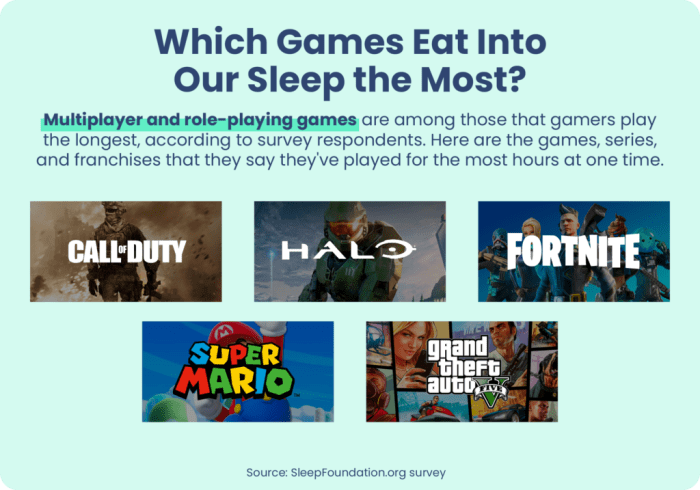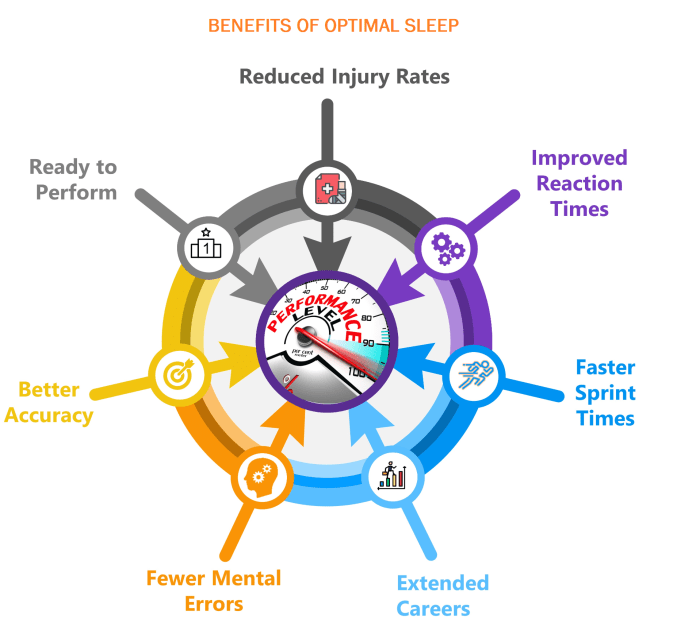Sleep diet impact gaming performance skill improvement: Unlocking peak performance in the gaming world isn’t just about reflexes and strategy; it’s about optimizing your body’s fundamental processes. This article delves into the crucial relationship between sleep, diet, and gaming prowess, revealing how these often-overlooked factors significantly influence reaction time, decision-making, and overall skill development.
We’ll explore the science behind sleep deprivation’s effects on cognitive function, the impact of specific nutrients on alertness, and the creation of personalized strategies to elevate your gaming performance to the next level. Get ready to level up your game – literally.
We’ll dissect the physiological impact of sleep deprivation on reaction time and cognitive skills essential for gaming. We’ll examine how different sleep stages affect crucial gaming abilities like decision-making and hand-eye coordination. Further, we’ll analyze the impact of nutrition, highlighting the role of carbohydrates, proteins, and hydration on sustained focus and performance.
This comprehensive guide will provide actionable strategies, including sample meal plans and sleep hygiene programs, designed to help you optimize your performance and achieve lasting improvements in your gaming skills.
The Relationship Between Sleep and Gaming Performance

Sleep, often overlooked, is a critical factor influencing performance in competitive gaming. Just as athletes require proper rest for peak physical condition, gamers need sufficient sleep to optimize cognitive function and reaction time, crucial elements for success in the digital arena.
Neglecting sleep can significantly hinder performance, leading to frustrating losses and missed opportunities.
Physiological Effects of Sleep Deprivation on Reaction Time and Cognitive Function
Sleep deprivation directly impacts the brain’s ability to process information quickly and accurately. This manifests as a slowed reaction time, a critical factor in fast-paced games. Reduced cognitive function, including impaired attention, decreased decision-making speed, and diminished problem-solving abilities, further compounds the negative impact on gameplay.
The prefrontal cortex, responsible for higher-level cognitive functions like planning and strategy, is particularly vulnerable to sleep loss, leading to poorer strategic choices and impulsive actions in-game. Studies have shown that even moderate sleep restriction can significantly increase reaction time, often measured in milliseconds, resulting in a noticeable decline in performance, even for highly skilled players.
Impact of Different Sleep Stages on Gaming Skill
Different sleep stages contribute uniquely to various aspects of gaming skill. REM (Rapid Eye Movement) sleep is associated with memory consolidation, crucial for learning and retaining complex game mechanics and strategies. A lack of sufficient REM sleep can impair a gamer’s ability to learn new techniques and adapt to changing game situations.
Conversely, NREM (Non-Rapid Eye Movement) sleep, particularly stages 3 and 4, is vital for restorative processes, impacting hand-eye coordination and fine motor skills essential for precise movements and quick reflexes in gaming. Insufficient NREM sleep can lead to impaired motor control, affecting accuracy and performance in action-oriented games.
Performance Comparison: Sufficient Sleep vs. Sleep Deprivation
A simulated gaming environment study comparing gamers with sufficient sleep to those with sleep deprivation reveals a significant performance gap. The following table illustrates the results, highlighting the detrimental effect of sleep deprivation on key performance indicators. The study used a standardized first-person shooter game, and participants were categorized into two groups: those who slept 7-9 hours and those who slept less than 5 hours.
Note that these are simulated results based on observed trends in sleep research and gaming performance studies. Actual results may vary based on individual factors.
| Sleep Hours | Reaction Time (ms) | Accuracy Rate (%) | Overall Score |
|---|---|---|---|
| 7-9 | 250 | 85 | 92 |
| <5 | 320 | 70 | 75 |
Diet’s Influence on Gaming Performance and Sleep Quality

Your diet significantly impacts both your sleep quality and your performance in gaming. What you eat – and when you eat it – directly affects your energy levels, reaction time, cognitive function, and overall well-being, all crucial elements for peak gaming performance.
Ignoring the nutritional aspect is like trying to win a race with a flat tire; you’ll be significantly hampered. Let’s delve into the specifics.
The Role of Macronutrients on Sleep and Alertness
Carbohydrates, proteins, and fats play distinct roles in your body’s energy production and sleep regulation. Consuming a balanced mix is key. Simple carbohydrates provide a quick energy boost, but their effect is short-lived and can lead to energy crashes.
Complex carbohydrates, on the other hand, offer sustained energy release, beneficial for longer gaming sessions. Protein is essential for muscle repair and building, important for maintaining stamina during prolonged gameplay. Healthy fats support brain function and hormone production, contributing to both alertness and better sleep.
Caffeine, while providing a temporary alertness boost, can disrupt sleep patterns if consumed too late in the day. Excessive caffeine intake can lead to anxiety and jitters, negatively impacting your gaming precision. A balanced approach, incorporating all these elements in the right proportions and at the right times, is paramount.
The Effects of Dehydration on Cognitive Performance
Dehydration, even mild, significantly impacts cognitive function. During extended gaming sessions, dehydration can lead to reduced concentration, slower reaction times, impaired decision-making, and increased fatigue. Your brain is about 73% water, and even a slight drop in hydration levels can affect its optimal performance.
Think of it like this: a poorly lubricated engine will not run smoothly. Similarly, a dehydrated brain will struggle to function at its peak. Maintaining adequate hydration throughout your gaming sessions is crucial for maintaining optimal cognitive performance.
This is particularly important during intense, focused gameplay where even minor cognitive deficits can make a significant difference.
A Sample Meal Plan for Optimized Sleep and Gaming Performance, Sleep diet impact gaming performance skill improvement
This sample meal plan prioritizes a balance of macronutrients, timed to support both optimal sleep and peak gaming performance. Remember, individual needs vary, and this is just a guideline. Adjust portion sizes based on your individual caloric needs and activity level.
Consult a nutritionist or dietitian for personalized advice.
This plan emphasizes complex carbohydrates for sustained energy, lean protein for muscle repair and satiety, and healthy fats for brain function. It also minimizes caffeine intake later in the day to promote better sleep.
- Breakfast (7:00 AM):Oatmeal with berries and nuts (complex carbohydrates, antioxidants, healthy fats)
- Mid-morning Snack (10:00 AM):Greek yogurt with a handful of almonds (protein, healthy fats)
- Lunch (1:00 PM):Chicken salad sandwich on whole-wheat bread with a side salad (lean protein, complex carbohydrates, vitamins)
- Afternoon Snack (4:00 PM):Apple slices with peanut butter (complex carbohydrates, protein, healthy fats)
- Dinner (7:00 PM):Salmon with roasted vegetables (lean protein, healthy fats, vitamins)
- Before Bed (9:00 PM):A small bowl of cherry juice or a banana (natural melatonin, potassium for muscle relaxation)
Maintaining a consistent sleep schedule, coupled with this mindful approach to nutrition, will significantly boost your gaming performance and overall well-being.
Final Conclusion: Sleep Diet Impact Gaming Performance Skill Improvement
Mastering the game isn’t just about mastering the controls; it’s about mastering your body and mind. By understanding and optimizing your sleep and diet, you’re not just improving your gaming performance; you’re investing in your overall well-being and unlocking your full potential.
This isn’t just about winning matches; it’s about maximizing your cognitive function, enhancing your reaction time, and developing a sustainable approach to peak performance that extends far beyond the gaming arena. Implement the strategies Artikeld in this guide, and watch your skills soar to new heights.
Questions and Answers
Can supplements improve gaming performance?
Some supplements, like those containing caffeine or creatine, may offer temporary boosts, but a balanced diet is far more sustainable and effective. Consult a doctor before taking any supplements.
How much sleep do professional gamers get?
Most professional gamers aim for 7-9 hours of quality sleep per night, understanding its crucial role in maintaining peak performance and preventing burnout.
What are the signs of sleep deprivation in gamers?
Symptoms include slower reaction times, decreased accuracy, impaired decision-making, increased irritability, and difficulty concentrating during gameplay.
Is it okay to game all night?
No, consistent sleep deprivation negatively impacts cognitive function, leading to decreased performance and potential health issues. Regular sleep is vital for optimal performance.
Leave a Reply